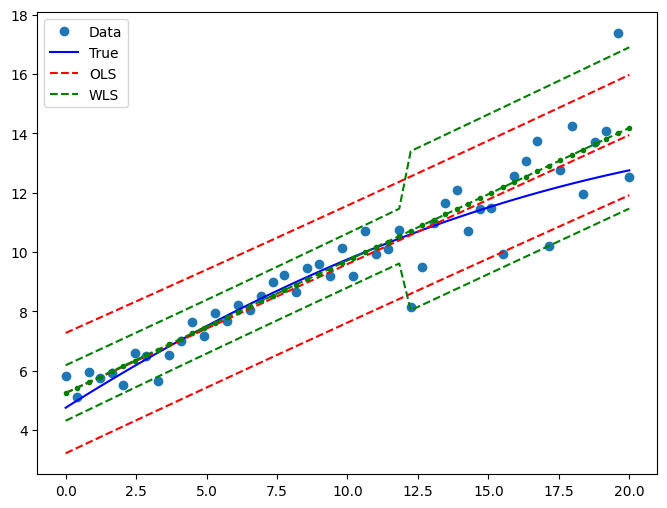Weighted Least Squares¶
[1]:
%matplotlib inline
[2]:
import matplotlib.pyplot as plt
import numpy as np
import statsmodels.api as sm
from scipy import stats
from statsmodels.iolib.table import SimpleTable, default_txt_fmt
np.random.seed(1024)
WLS Estimation¶
Artificial data: Heteroscedasticity 2 groups¶
Model assumptions:
Misspecification: true model is quadratic, estimate only linear
Independent noise/error term
Two groups for error variance, low and high variance groups
[3]:
nsample = 50
x = np.linspace(0, 20, nsample)
X = np.column_stack((x, (x - 5) ** 2))
X = sm.add_constant(X)
beta = [5.0, 0.5, -0.01]
sig = 0.5
w = np.ones(nsample)
w[nsample * 6 // 10 :] = 3
y_true = np.dot(X, beta)
e = np.random.normal(size=nsample)
y = y_true + sig * w * e
X = X[:, [0, 1]]
WLS knowing the true variance ratio of heteroscedasticity¶
In this example, w is the standard deviation of the error. WLS requires that the weights are proportional to the inverse of the error variance.
[4]:
mod_wls = sm.WLS(y, X, weights=1.0 / (w ** 2))
res_wls = mod_wls.fit()
print(res_wls.summary())
WLS Regression Results
==============================================================================
Dep. Variable: y R-squared: 0.927
Model: WLS Adj. R-squared: 0.926
Method: Least Squares F-statistic: 613.2
Date: Fri, 05 Dec 2025 Prob (F-statistic): 5.44e-29
Time: 18:08:13 Log-Likelihood: -51.136
No. Observations: 50 AIC: 106.3
Df Residuals: 48 BIC: 110.1
Df Model: 1
Covariance Type: nonrobust
==============================================================================
coef std err t P>|t| [0.025 0.975]
------------------------------------------------------------------------------
const 5.2469 0.143 36.790 0.000 4.960 5.534
x1 0.4466 0.018 24.764 0.000 0.410 0.483
==============================================================================
Omnibus: 0.407 Durbin-Watson: 2.317
Prob(Omnibus): 0.816 Jarque-Bera (JB): 0.103
Skew: -0.104 Prob(JB): 0.950
Kurtosis: 3.075 Cond. No. 14.6
==============================================================================
Notes:
[1] Standard Errors assume that the covariance matrix of the errors is correctly specified.
OLS vs. WLS¶
Estimate an OLS model for comparison:
[5]:
res_ols = sm.OLS(y, X).fit()
print(res_ols.params)
print(res_wls.params)
[5.24256099 0.43486879]
[5.24685499 0.44658241]
Compare the WLS standard errors to heteroscedasticity corrected OLS standard errors:
[6]:
se = np.vstack(
[
[res_wls.bse],
[res_ols.bse],
[res_ols.HC0_se],
[res_ols.HC1_se],
[res_ols.HC2_se],
[res_ols.HC3_se],
]
)
se = np.round(se, 4)
colnames = ["x1", "const"]
rownames = ["WLS", "OLS", "OLS_HC0", "OLS_HC1", "OLS_HC3", "OLS_HC3"]
tabl = SimpleTable(se, colnames, rownames, txt_fmt=default_txt_fmt)
print(tabl)
=====================
x1 const
---------------------
WLS 0.1426 0.018
OLS 0.2707 0.0233
OLS_HC0 0.194 0.0281
OLS_HC1 0.198 0.0287
OLS_HC3 0.2003 0.029
OLS_HC3 0.207 0.03
---------------------
Calculate OLS prediction interval:
[7]:
covb = res_ols.cov_params()
prediction_var = res_ols.mse_resid + (X * np.dot(covb, X.T).T).sum(1)
prediction_std = np.sqrt(prediction_var)
tppf = stats.t.ppf(0.975, res_ols.df_resid)
[8]:
pred_ols = res_ols.get_prediction()
iv_l_ols = pred_ols.summary_frame()["obs_ci_lower"]
iv_u_ols = pred_ols.summary_frame()["obs_ci_upper"]
Draw a plot to compare predicted values in WLS and OLS:
[9]:
pred_wls = res_wls.get_prediction()
iv_l = pred_wls.summary_frame()["obs_ci_lower"]
iv_u = pred_wls.summary_frame()["obs_ci_upper"]
fig, ax = plt.subplots(figsize=(8, 6))
ax.plot(x, y, "o", label="Data")
ax.plot(x, y_true, "b-", label="True")
# OLS
ax.plot(x, res_ols.fittedvalues, "r--")
ax.plot(x, iv_u_ols, "r--", label="OLS")
ax.plot(x, iv_l_ols, "r--")
# WLS
ax.plot(x, res_wls.fittedvalues, "g--.")
ax.plot(x, iv_u, "g--", label="WLS")
ax.plot(x, iv_l, "g--")
ax.legend(loc="best")
[9]:
<matplotlib.legend.Legend at 0x7f3b25f01450>

Feasible Weighted Least Squares (2-stage FWLS)¶
Like w, w_est is proportional to the standard deviation, and so must be squared.
[10]:
resid1 = res_ols.resid[w == 1.0]
var1 = resid1.var(ddof=int(res_ols.df_model) + 1)
resid2 = res_ols.resid[w != 1.0]
var2 = resid2.var(ddof=int(res_ols.df_model) + 1)
w_est = w.copy()
w_est[w != 1.0] = np.sqrt(var2) / np.sqrt(var1)
res_fwls = sm.WLS(y, X, 1.0 / ((w_est ** 2))).fit()
print(res_fwls.summary())
WLS Regression Results
==============================================================================
Dep. Variable: y R-squared: 0.931
Model: WLS Adj. R-squared: 0.929
Method: Least Squares F-statistic: 646.7
Date: Fri, 05 Dec 2025 Prob (F-statistic): 1.66e-29
Time: 18:08:14 Log-Likelihood: -50.716
No. Observations: 50 AIC: 105.4
Df Residuals: 48 BIC: 109.3
Df Model: 1
Covariance Type: nonrobust
==============================================================================
coef std err t P>|t| [0.025 0.975]
------------------------------------------------------------------------------
const 5.2363 0.135 38.720 0.000 4.964 5.508
x1 0.4492 0.018 25.431 0.000 0.414 0.485
==============================================================================
Omnibus: 0.247 Durbin-Watson: 2.343
Prob(Omnibus): 0.884 Jarque-Bera (JB): 0.179
Skew: -0.136 Prob(JB): 0.915
Kurtosis: 2.893 Cond. No. 14.3
==============================================================================
Notes:
[1] Standard Errors assume that the covariance matrix of the errors is correctly specified.